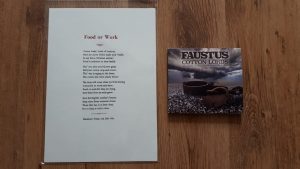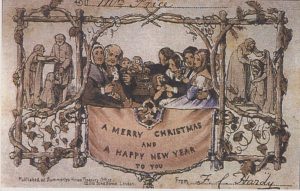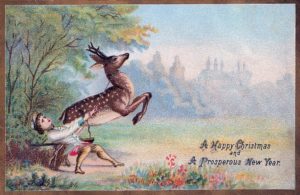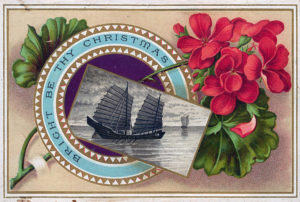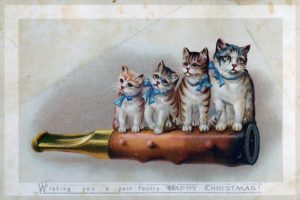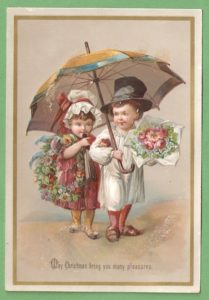Welcome to the penultimate day of our Cotton Famine Christmas Countdown, and the eve of our Christmas event! Free tickets for the event are still available here: https://www.eventbrite.co.uk/e/the-twelve-cotton-famine-poems-of-christmas-tickets-52954230529
Today’s poem is ‘Merry Christmas Eve’ by the Chartist poet Gerald Massey. It was published in the Blackburn Times on December 26th, 1863.
MERRY CHRISTMAS EVE.
BY GERALD MASSEY.
Merry Christmas Eve! in the Palace where knavery
Crowds all the treasures the fair world can render;
Where spirits grow rusted in silkenest slavery,
And life is out-panted, in sloth and in splendour;
In gladness and glory, Wealth’s darlings were meeting,
And jewel-claspt fingers linkt softly again;
New friendships were twining, and old friends were greeting,
And twin hearts grew one, in God’s golder love chain.
Merry Christmas Eve! in a poor man’s grim hovel,
There huddled in silence a famishing family;
Church bells were laughing in musical revel.
They heard the loud mockery, with brows throbbing clammily;
All in the merry time there they sat, mourning —
Two sons – two brothers – in penal chains bleeding;
Their hearts wandered forth to the never-returning,
Who rose on their vision, pale, haggard, and pleading.
Merry Christmas Eve! for the rich, as in duty,
Taste pander’d and ruby wine woo’d on the board,
Eyes smiled in feign’d glory, on birth, and on beauty;
And lying lips flatter’d the Mammonite lord.
Love-kisses sobb’d out, ‘twixt the rollic and rout,
And Hope went forth, reaping in long-promist treasure.
What matter, tho’ hearts might be breaking without?
Their groans were unheard in the palace of pleasure.
Merry Christmas Eve! but the stricken ones heard
No neighbourly welcome, no kind voice of kin;
They look’t at each other, but spake not a word,
While through crevice, and cranny, the sleet drifted in.
In a desolate corner, one, hunger-kill’d, lay,
And the mother’s hot tears were the bosom-babe’s food.
What marvel, O Statesmen, what marvel, I pray,
Such misery nurseth Crime’s dark viper-brood?
O men, angel-imaged in Nature’s fair mint,
And is it for this, ye were fashioned dvine?
Ah, where’s the god-stamp – Immortality’s print?
We are tyrants and slaves, knit in one tortured twine;
That a few, like to gods, may stride over the earth,
Millions, born to heart murder, are given in pawn;
When will the world quicken for Liberty’s birth,
Which she waiteth, with eager wings beating the dawn?
False priests, dare ye say ‘tis the will of your God,
(And shroud the Christ’s message in dark sophistry,)
That these millions of paupers should bow to the sod?
Up, up, trampled hearts, it’s a lie! it’s a lie!
They may carve “State” and “Altar” in characters golden,
But Tyranny’s symbols are ceasing to win;
Be stirring, O people, your scroll is unfolden,
And bright be the deeds ye emblazon within.
Commentary
Newspapers like the Blackburn Times often reprinted poems from earlier collections, as they have done here with Gerald Massey’s ‘Merry Christmas Eve’. This is one of Massey’s earliest poems, originally published in 1850 as ‘’Twas Christmas Eve.’ Nonetheless, the poem feels relevant to the circumstances of the Cotton Famine because of its discussion of poverty and social injustice. In alternate stanzas, Gerald Massey paints contrasting pictures of Christmas Eve in rich and poor households respectively. Though it is not an abolitionist poem, slavery is evoked as a metaphor for the condition of the working classes, and its repeated mention may well have felt significant in the 1860s given the context of the American Civil War. Unlike many of the Christmas poems we have featured, ‘Merry Christmas Eve’ does not contrast wealth and poverty in a call for charity, but rather to inspire political action among the working classes with the rousing final lines: “Be stirring, O people, your scroll is unfolden, / And bright be the deeds ye emblazon within.”
For anyone interested in Massey’s life and work, and in Victorian working-class writers more generally, we highly recommend Ian Petticrew’s excellent website. http://gerald-massey.org.uk/
Dr Ruth Mather, University of Exeter
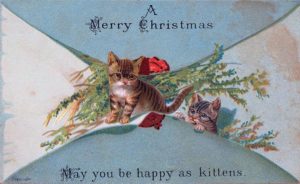
A Victorian Christmas Card, from Nova Scotia Archives on flickr.com
